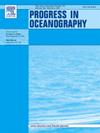中国南海东北部涡旋动能的长期变化
IF 3.8
3区 地球科学
Q1 OCEANOGRAPHY
引用次数: 0
摘要
中国南海东北部(NE-SCS)涡旋动能(EKE)的季节到年际变化已被广泛研究,并被认为与吕宋海峡黑潮路径的状态密切相关。然而,由于缺乏长期观测资料和高分辨率模拟,南海东北部 EKE 的十年变化仍未得到研究。本研究利用卫星观测资料和海军耦合海洋数据同化的全球 HYbrid 坐标海洋模式再分析资料,显示了东北-南中国海近 30 年的 EKE 变化趋势。研究发现,由于自 20 世纪 90 年代以来吕宋海峡的黑潮减弱,黑潮在东北-南中国海的环流路径增强,诱发了该区域更强的 EKE。进一步的分析表明,当黑潮侵入东北-南中国海并给环流内部带来更多的势能时,气压不稳定性的能量传递对 EKE 的增加起主导作用。吕宋海峡沿岸的黑潮状态是调节 NE-SCS EKE 的关键。此外,1993-2020 年期间吕宋海峡沿岸黑潮的长期减弱是由副热带模式水量的减少决定的,这与大西洋多年涛动的正相位相对应。这项研究深入探讨了边缘海(即南中国海)和开阔洋(即西太平洋)之间的相互作用,并最终与全球气候变化联系起来。本文章由计算机程序翻译,如有差异,请以英文原文为准。
Long-term variation of the eddy kinetic energy in the Northeastern South China sea
The seasonal to interannual variability of eddy kinetic energy (EKE) in the Northeastern South China Sea (NE-SCS) has been widely studied and it is recognized that they are strongly related to the state of the Kuroshio pathway in the Luzon Strait. While, due to the lack of long-term observations and high-resolution simulations, the decadal change of EKE in NE-SCS remains unexplored. In this study, we show the EKE trend in the past ∼ 30 years in the NE-SCS by using satellite observation and global HYbrid Coordinate Ocean Model reanalysis with the Navy Coupled Ocean Data Assimilation. It is found that due to the weakening of the Kuroshio in the Luzon Strait since 1990 s, the Kuroshio shows an enhanced looping path in the NE-SCS, inducing stronger EKE in this region. Further analysis confirms that the energy transfer by baroclinic instability is dominant for the increasing of EKE, when the Kuroshio intrudes into the NE-SCS and brings more potential energy inside the circulation. The Kuroshio state along the Luzon Strait is the key for modulating the EKE in the NE-SCS. Furthermore, the long-term weakening of Kuroshio current along the Luzon strait during 1993–2020 is determined by the decreasing of subtropical mode water, corresponding to the positive phase of the Atlantic Multidecadal Oscillation. This study provides insight into the interaction between marginal sea (i.e., the SCS) and the open ocean (i.e., the western Pacific Ocean), finally linking to the global climate change.
求助全文
通过发布文献求助,成功后即可免费获取论文全文。
去求助
来源期刊

Progress in Oceanography
地学-海洋学
CiteScore
7.20
自引率
4.90%
发文量
138
审稿时长
3 months
期刊介绍:
Progress in Oceanography publishes the longer, more comprehensive papers that most oceanographers feel are necessary, on occasion, to do justice to their work. Contributions are generally either a review of an aspect of oceanography or a treatise on an expanding oceanographic subject. The articles cover the entire spectrum of disciplines within the science of oceanography. Occasionally volumes are devoted to collections of papers and conference proceedings of exceptional interest. Essential reading for all oceanographers.
 求助内容:
求助内容: 应助结果提醒方式:
应助结果提醒方式:


